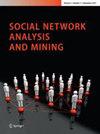Community deception in directed influence networks
IF 2.3
Q3 COMPUTER SCIENCE, INFORMATION SYSTEMS
引用次数: 0
Abstract
Abstract Community deception is about protecting users of a community from being discovered by community detection algorithms. This paper studies community deception in directed influence network (DIN). It aims to address the limitations of the state of the art through a twofold strategy: introducing directed influence and considering the role of nodes in the deception strategy. The study focuses on using modularity as the optimization function. It offers several contributions, including an upgraded version of modularity that accommodates the concept of influence, edge-based, and node-based deception algorithms.. The study concludes with a comparison of the proposed methods with the state of the art showing that not only influence is a valuable ingredient to devising deception strategies but also that novel deception approaches centered on node operations can be successfully devised.直接影响网络中的社区欺骗
摘要社区欺骗是指保护社区用户不被社区检测算法发现。研究了定向影响网络中的群体欺骗问题。它旨在通过一种双重策略来解决现有技术的局限性:引入定向影响和考虑欺骗策略中节点的作用。研究的重点是使用模块化作为优化函数。它提供了几个贡献,包括模块化的升级版本,该版本容纳了影响、基于边缘和基于节点的欺骗算法的概念。该研究最后将所提出的方法与现有方法进行了比较,表明影响不仅是设计欺骗策略的重要因素,而且可以成功地设计出以节点操作为中心的新型欺骗方法。
本文章由计算机程序翻译,如有差异,请以英文原文为准。
求助全文
约1分钟内获得全文
求助全文
来源期刊

Social Network Analysis and Mining
COMPUTER SCIENCE, INFORMATION SYSTEMS-
CiteScore
5.70
自引率
14.30%
发文量
141
期刊介绍:
Social Network Analysis and Mining (SNAM) is a multidisciplinary journal serving researchers and practitioners in academia and industry. It is the main venue for a wide range of researchers and readers from computer science, network science, social sciences, mathematical sciences, medical and biological sciences, financial, management and political sciences. We solicit experimental and theoretical work on social network analysis and mining using a wide range of techniques from social sciences, mathematics, statistics, physics, network science and computer science. The main areas covered by SNAM include: (1) data mining advances on the discovery and analysis of communities, personalization for solitary activities (e.g. search) and social activities (e.g. discovery of potential friends), the analysis of user behavior in open forums (e.g. conventional sites, blogs and forums) and in commercial platforms (e.g. e-auctions), and the associated security and privacy-preservation challenges; (2) social network modeling, construction of scalable and customizable social network infrastructure, identification and discovery of complex, dynamics, growth, and evolution patterns using machine learning and data mining approaches or multi-agent based simulation; (3) social network analysis and mining for open source intelligence and homeland security. Papers should elaborate on data mining and machine learning or related methods, issues associated to data preparation and pattern interpretation, both for conventional data (usage logs, query logs, document collections) and for multimedia data (pictures and their annotations, multi-channel usage data). Topics include but are not limited to: Applications of social network in business engineering, scientific and medical domains, homeland security, terrorism and criminology, fraud detection, public sector, politics, and case studies.
 求助内容:
求助内容: 应助结果提醒方式:
应助结果提醒方式:


